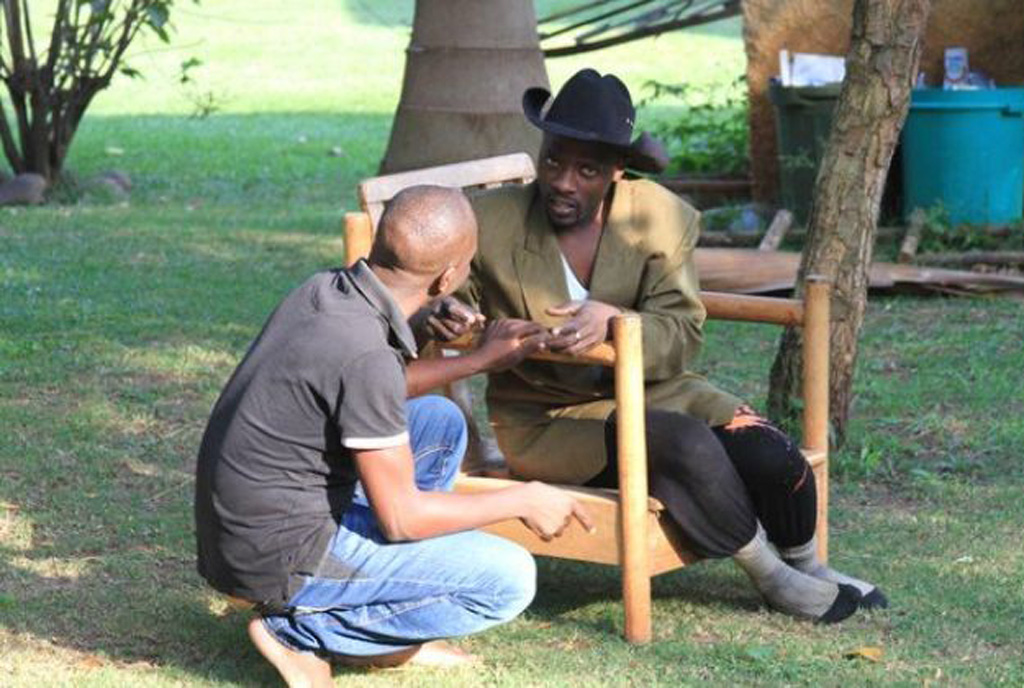The laugh family: Sketch comedy has captivated Ugandans, from Amarula Family’s humour to Philip Luswata’s intelligence with Theatre Factory, It could explain why even with the existence of many comedy outfits, Swengere has become a hit on Facebook, Instagram and Youtube. Isaac Mufumba talked to their leader Hussein Ibanda.
You probably have seen an inventor running full steam chasing after his invention that has gained so much momentum, that he does not know how to slow it down or stop it without a wreck.
That is akin to what Hussein Muyonjo Ibanda, alias Swengere is going through.
Three years ago Swengere started as a comic audio skit designed to entertain listeners of Baba FM at the top of the hour, but not anymore. It has turned into an audiovisual comic skit that is making a major buzz on televisions, social media and wherever he goes.
“It turned out to be an instant audio hit. It became even a bigger hit when we went into visuals. Sometimes I feel overwhelmed,” he says.
The realisation came early in April 2016 in Mayuge District during the burial of the late former Cranes goalkeeper, Abbey Dhaira.
“I witnessed something I had never seen before. The minute the master of ceremonies announced that Swengere had arrived, people started jostling to catch a glimpse of us. Suddenly all the Cranes stars who were in attendance had been relegated to the periphery,” he says.
The huge number of fans includes his wife and children. Luckily the children seem to know the difference between Daddy and Swengere.
“None of the children ever refers to me as Swengere. When some of the children they play with call me Swengere, they tell them “that is our Dad; Do not call him Swengere. So I think they tell the difference,” he says.
Comedy
Ibanda was born on June 16, 1986 in Mafubira, a small trading centre on the Jinja-Kamuli highway.
He studied at Mafubira Primary School and Mpumudde High School before dropping out in Senior Five to become a taxi conductor in Jinja Taxi Park. It was there that he reignited comical conduct, which he had abandoned after dropping out of school.
“While in the taxi park, I went about my life as an entertainer. It sometimes takes a while for a taxi to fill up. Sometimes the passengers get impatient and walk out. I would always distract them with a few jokes and comics,” he says.
From the park he did a stint as a driver with Jyoti Structures Limited before joining Apex FM in 2010. Which became the big stage he had been waiting for.
The big shoes
He had been meant to be the main presenter, backed by a co-host and comedian on the morning show, but he soon eclipsed the comedian.
The station also used to broadcast localised commentaries of English premier league matches where the house comedian would be required to punch in a joke or two. With the house comedian absent, Ibanda was at some point asked to take his place.
“I must have done it very well because he insisted that I stay. That is when the name Mafaranga came in,” he says.
Skits
The programmes’ director, Mr Frank Bwire, came up with an idea of producing skits to keep the listeners entertained at the top of every hour.
It marked the beginning of the production of skits under the stage name Mafaranga which were instant hits attracting interest from a producer, Patrick Kwezi alias Pato.
“At the time I wanted to venture into filming local content, especially comedy. I had, therefore, been listening to so many local comedians on radio. I thought that he was the best,” says Pato who is now Swengere’s manager.
Ibanda did not buy Pato’s idea.
“I kept dodging him because I thought it was impossible. I dodged him for more than four years,” he says with another chuckle.
Birth of Swengere
In 2014 Ibanda joined Baba FM. In 2016 a change in the leadership saw Innocent Anyole become the programmes’ director, which in turn led to the creation of team to help with the development of new products.
Ibanda felt that what he had been doing at Apex FM could be replicated on Baba FM under a different name. Anyole tasked the group with finding a name for the proposed new skits.
“Initially I suggested the name Zwanga, which youth normally use to describe a mentally unstable person, but Anyole rejected it saying it would be associated with madness, but the word Swengere instantly came up. We did not know what it meant, but we felt it was good,” he says.
Do they know what it means now?
“Now it is a Lusoga word which means a person who does not run out of ideas. He is always levelheaded whatever the circumstances or challenges,” he says in typical Swengere style.
Audio visuals
Readers of the Bible are all too aware of the teaching in Mathew 22:14 that: “For many are called, but few are chosen”.
When Pato returned with the suggestion he had earlier tabled, Ibanda tried to invite all his colleagues to be part of the project, but few embraced it.
At some point it was only him and Ibrahim Muddukaki-Mukasa alias Kalibbala available to do the videos. That explains why it was the duo in the introductory video
The first video was about family planning. Swengere, while discussing spacing of children, boasts that he had spaced his so well because the first one was born in Iganga, the second one in Kampala and the third one in Masaka. Simply hilarious!
In the second video, Zakia Namulondo, acting as his wife asks Swengere what he loves most between beer and his wife. Swengere chooses the beer! The rest, as they say, is history.
The videos were an instant hit. With a few months Swengere had 290,000 followers on Facebook, more than 30,000 followers on You Tube and about 3,000 more on Instagram, but that did not mean that they were smiling all the way to the bank. Sponsorship packages had to come in first.
In the middle of 2016 one of the television stations came calling. That is every artiste’s dream.
“I was euphoric! I was at Baba FM having lunch. I stopped and told whoever cared to listen to what had happened. I felt that we had hit big. I jumped onto a motorcycle and came to the manager. ‘Boss, we have hit the jackpot. Hurry up and contact them,’ I told him.”
To his chagrin, a few minutes later Pato returned to announce that the offer was unacceptable. He felt shattered.
“I must have cried. I could see that we had lost a very big opportunity,” he recalls.
That was, however, not to be the last time he felt so much anguish. It happened twice more, but towards the end of 2017, there was a breakthrough when he accepted a deal for Bukedde TV. With the deal came more sponsorship packages and shows. The money is coming in, but the group is not sitting on its laurels.
“Swengere is only the first project. We are working on another project which is not a comedy,” says Pato.
One just wonders what it will be like.
History of the sketch
Sketch comedy comprises a series of short scenes or vignettes, called “sketches”, commonly between one and 10 minutes long.
Such sketches are performed by a group of comic actors or comedians, either on stage or through an audio or visual medium such as radio and television. Often sketches are first improvised by the actors and sketched down based on the outcome of these improvisational sessions.
Sketch comedy has its origins in vaudeville and music hall, where a large number of brief, but humorous, acts were strung together to form a larger programme.
Sketch comedians routinely differentiate their product from a “skit”, maintaining that a skit is a (single) dramatized joke while a sketch is a comedic exploration of a concept, character or situation.
While separate sketches historically have tended to be unrelated, more recent groups have introduced overarching themes that connect the sketches within a particular show with recurring characters that return for more than one appearance.

